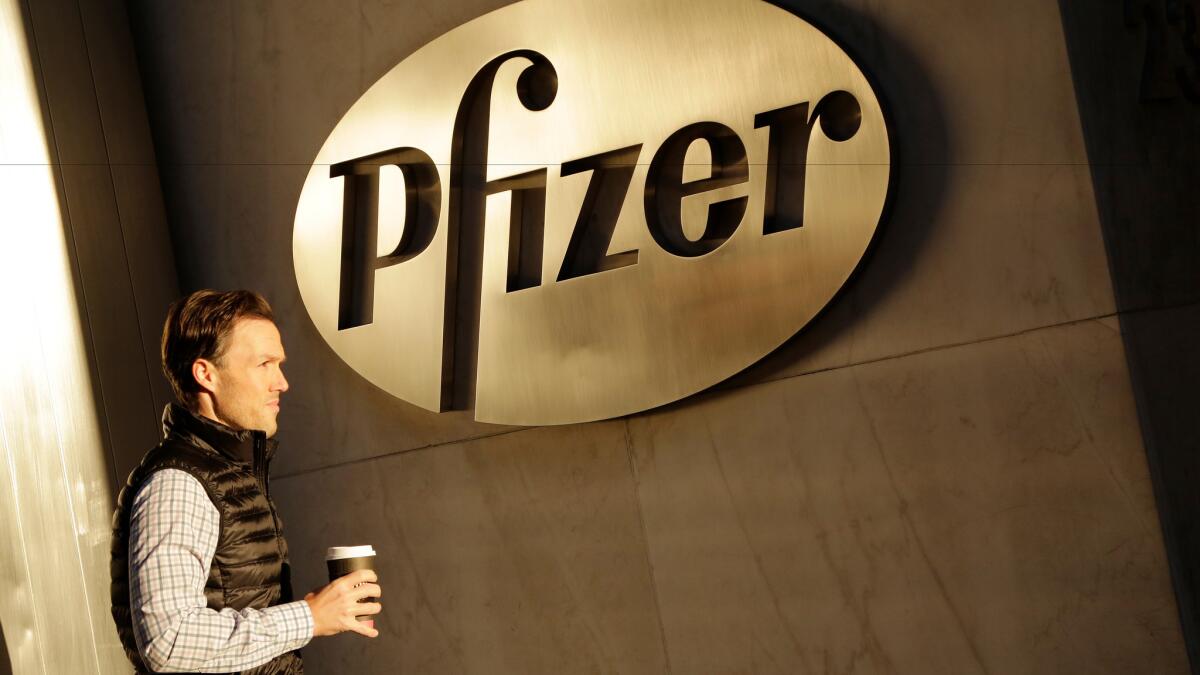Pfizer to pay $14 billion for Medivation, whose drug Xtandi was discovered by UCLA

- Share via
Reporting from Washington — Pharmaceutical giant Pfizer Inc. is paying $14 billion to buy Medivation Inc., a San Francisco biotech company that sells a high-priced prostate cancer medication discovered by UCLA.
A year’s worth of the drug, Xtandi, sells for about $129,000, and the medicine has generated about $2.2 billion in net sales worldwide over the last year, the companies said Monday in announcing the deal.
For the record:
12:54 a.m. July 12, 2025An earlier version of this article said Royal Pharma paid $1.14 billion to acquire the royalty rights to Xtandi. The company’s name is Royalty Pharma.
Medivation had become a prime target of larger pharmaceutical companies, largely thanks to Xtandi, which is also being tested for breast cancer treatment.
Pfizer Chief Executive Ian Read said “the value of Xtandi and its future growth potential was the principal driver” of the deal.
“With this acquisition, we are expanding and strengthening our footprint in one of the highest-growth therapeutic areas in the biopharmaceutical industry,” he told analysts on a conference call.
New York-based Pfizer agreed to pay $81.50 in cash for each share of Medivation, a 21% premium over Friday’s closing price of $67.16.
Medivation stock rose $13.26, or 20%, to $80.42 on Monday. Pfizer shares fell 14 cents, or 0.4%, to $34.84.
“We believe that Pfizer is the ideal partner to extend the reach of our blockbuster Xtandi franchise and take our promising, late-stage assets — talazoparib and pidilizumab — to their next stages of development so that they can be made available to patients as quickly as possible,” said Dr. David Hung, Medivation’s founder and CEO.
Talazoparib is a breast cancer drug that is in phase 3 clinical trials. Pidilizumab is being developed to treat lymphoma and other blood-related diseases.
But Xtandi, which Medivation sells in partnership with Japan’s Astellas Pharma Inc., was the star of the deal for Pfizer, said David Nierengarten, managing director and head of healthcare equity research at Wedbush Securities.
“They get a share of the best prostate cancer drug on the market,” he said.
Xtandi’s possible use as a breast cancer treatment boosted Medivation’s value, Nierengarten said.
With a highly desirable drug already on the market, Medivation was in strong demand. The company rebuffed a $9.3-billion bid from French pharmaceutical company Sanofi this year. Four other companies, including Gilead Sciences Inc. and Celgene Corp., also were reportedly interested in acquiring Medivation.
Medivation’s stock began soaring in late 2011 after it reported positive results from its clinical trials of Xtandi. The following year, the Food and Drug Administration approved the medication for treatment of prostate cancer.
It is the company’s only federally approved drug, and accounted for all the $954 million in revenue for Medivation last year, when the company reported $245 million in profit.
Net sales of Xtandi in the U.S. increased 69% last year from 2014, and nearly doubled worldwide. Worldwide sales of the drug were up 22% in the second quarter compared with a year earlier, and increased 11% in the U.S. during that period.
The San Francisco company has about 600 employees and posted a $404-million loss on $206 million in revenue in the second quarter of this year. Medivation said the loss was related to expenses from its purchase last year of all worldwide rights to talazoparib from BioMarin Pharamaceuticals Inc. of San Rafael, Calif.
In June, federal officials rejected an effort to allow other companies to sell Xtandi for lower prices, a decision that boosted Medivation’s attraction.
Two nonprofit groups had made the request, arguing that the federal government could allow lower-priced competition because UCLA scientists had used taxpayer-funded grants in their research.
Xtandi, also known by the generic name enzalutamide, was patented by UCLA in 2005 and licensed to Medivation.
In March, Royalty Pharma, a pharmaceutical investment company, paid $1.14 billion to acquire the royalty rights to Xtandi in the largest-ever technology transfer deal involving a UC invention. UCLA received $520 million of the money for its 43.9% ownership stake in the drug.
UCLA put the money in a portfolio that was expected to generate $60 million a year until 2027, when major patents on the drug expire. UCLA said it would use the money to pay for research, undergraduate scholarships and graduate student fellowships.
The university opted for the lump-sum payment on Xtandi rather than annual royalties.
“I’m sure UCLA saw a potential use for that lump-sum payment that is greater than waiting around for that stream of royalty payments,” Nierengarten said.
Westwood Technology Transfer, an advisory board established by UCLA to help maximize the value of the university’s patents, recommended the deal with Royal Pharmacy.
“UCLA’s sale of its royalty interest in Xtandi was intended to provide financial stability while minimizing risks associated with the volatility of the pharmaceutical marketplace,” the university said in a statement Monday. “The March transaction allowed us to move forward with planning for strategic investments in research and student scholarships. Those investments, aimed at generating additional discoveries that serve the public good, are our focus.”
The Pfizer-Medivation deal is subject to antitrust review, and the companies said they expect it to close by the end of the year. Each company’s board of directors unanimously approved the deal. If the deal is not completed, Medivation will have to pay a $510-million termination fee, according to a regulatory filing.
MORE BUSINESS NEWS
A manufacturing boom lifts Mexico — and some U.S. workers, despite trade fears
How talent agencies help athletes who ‘transcend sports’ cash in on Olympics heroics
Management has a duty to maintain careful custody of payments for HOA dues
UPDATES:
6:25 p.m. This article has been updated with a statement from UCLA.
1:20 p.m.: This article has been updated with additional information about Medivation and closing stock prices for the company and Pfizer.
10 a.m.: This article was updated with analyst comment and more details about Xtandi’s pricing.
7:55 a.m.: This article was updated with Times staff reporting, including details about Medivation and UCLA’s connection to the drug Xtandi.
This article originally was published at 4:05 a.m.
More to Read
Inside the business of entertainment
The Wide Shot brings you news, analysis and insights on everything from streaming wars to production — and what it all means for the future.
You may occasionally receive promotional content from the Los Angeles Times.










